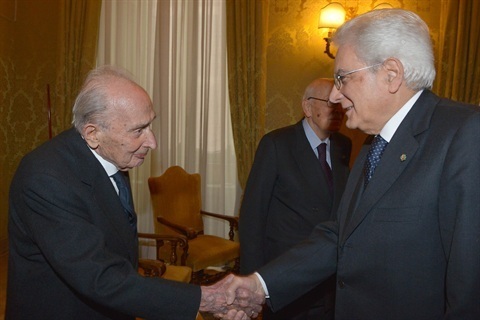Giovanni Sartori, a widely recognized scholar and wordsmith is no longer with us. Like the rest of us, he was allotted his own time on this planet. Few of us however have used prose as originally, as brilliantly or sometimes as sarcastically as he. By any measure Sartori was as powerful an intellectual polemicist as our profession has known for the last century. No other contemporary political scientist has seen his most pointed and penetrating verbal thrusts carefully collected and reproduced on the Internet. Just a glance at some of these formulations tells the reader much about the extraordinary quality of this man.
Vanni Sartori had a low level of tolerance for those who might disagree with him intellectually, or politically. Regarding such opponents he could be and often was as cutting in his remarks as once was Giacomo Leopardi, a memorable poet, often wrongly described by the Florentines as one of their own. Sartori’s ability, indeed his relish, to cut down politicians by caricature was impossible not to admire, to match, and perhaps to fear. Office holders as different as Bettino Craxi, Silvio Berlusconi and, most recently, Matteo Renzi would testify to these Sartorian depictions, and not often with glee or satisfaction No other political scientist can claim actually to have baptized electoral laws with hard-to-match nomenclature like “Mattarellum” and “Porcellum.” I know that one of Sartori’s most painful and enduring distresses was Italy’s apparent inability to adopt a simple French-type electoral system—much along the lines that he, Sartori, kept recommending.
I met Giovanni Sartori in 1957, on one of my “visiting professorship” years in Italy, at the University of Florence’s famous “Facoltà Cesare Alfieri.” He was then already a prolific and much-admired scholar. Academic life could not have been easy then for a young political scientist, given that no academic chair in that subject had been authorized in postwar Italy. Indeed the field of sociology preceded that of political science, once expansion became politically feasible. Giovanni Sartori, who held the first new chair in sociology occupied that position. My guess is that few Italians, ever, were as uncomfortable as he was to be confirmed as a “Professore Ordinario di Sociologia.”

It is easily arguable that the quality of Sartori’s academic writings was a major factor in the breakthrough that the discipline of political science experienced, beginning just a few decades ago. At the global level as well, Sartori has had a distinctive influence on the discipline, particularly in the critically important area of the formation of and research into basic political concepts. His much-admired scholarly writings on the subject of “democratic theory” remain among the most widely read such literature. During his lifetime he was generally understood to be in Italy the outstanding scholar in his discipline. That powerful scholarly reputation brought him eventual recognition by and membership in the American Academy of Arts and Sciences. As other obituaries will show, this one only one of the many academic and scholarly rewards he accumulated.
Sartori at times was very much like the rest of us, that is, only human. And thus he could err. As he did, for example, when he left the Florence he loved, for Stanford University. He wrongly believed, in the 1970s, that the Italian Communist Party (and therefore the U.S.S.R.) might be coming to power in Italy. No argument to the contrary could move his resolve to get out. He was arguably equally blinkered about the evolutionary direction the discipline of political science would take, once a strong tradition of rigorous empirical research came to define what so many of his colleagues did, in Italy as well as abroad.
We once invited Sartori to spend a sabbatical year at Yale. His presence by chance corresponded with the terrible flood suffered by Florence, his native city, in the mid-1960s. On the day of the flood, and at a dinner party then held in his honor, Sartori was asked by a guest what the Mayor of Florence might do in those dire circumstances. He quickly replied that he hoped that Mayor La Pira had consulted Machiavelli’s “Discourses.” We who thought this quip to be an example of Sartorian chutzpah were quickly cut down to size. On consulting the famous treatise, one finds an entry suggesting what the Prince should do if and when the Arno were to overflow its banks! It turned out the Mayor La Pira had not consulted Machiavelli, and perhaps paid for it politically.
That instant remains for me the pithiest description of a very proud, sometimes sarcastic, often impatient and always profoundly interesting Florentine who was a fine scholar. We will miss him.
 Joseph LaPalombara, is the Arnold Wolfers Professor of Political Science and Management Emeritus at Yale University, and a Senior Research Scholar in the Center for Comparative Research. Publications include: Politics Within Nations (1974); Democracy, Italian Style (1987); Multinational Corporations and Developing Countries (1981); two chapters (“Underestimated Contributions of Political Science to Organizational Learning,” and “Power and Politics in Organizations”) in Handbook of Organizations Learning (2001) and Stati uniti? Italia e USA a confronto (2009). He has been awarded the Medals of Honor by the Presidency of the Italian Republic and by the Italian Constitutional Court.
Joseph LaPalombara, is the Arnold Wolfers Professor of Political Science and Management Emeritus at Yale University, and a Senior Research Scholar in the Center for Comparative Research. Publications include: Politics Within Nations (1974); Democracy, Italian Style (1987); Multinational Corporations and Developing Countries (1981); two chapters (“Underestimated Contributions of Political Science to Organizational Learning,” and “Power and Politics in Organizations”) in Handbook of Organizations Learning (2001) and Stati uniti? Italia e USA a confronto (2009). He has been awarded the Medals of Honor by the Presidency of the Italian Republic and by the Italian Constitutional Court.









